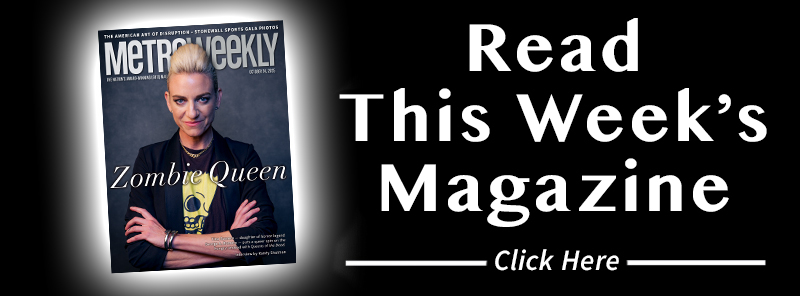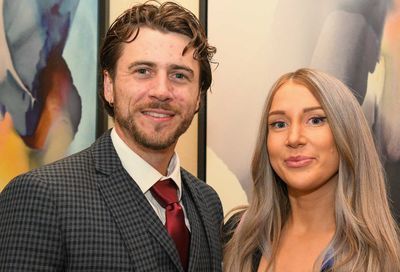Rattle and Hum
Melissa Ferrick thunders, but Miss Kittin loses her purr
There was no rain at this year’s Capital Pride Festival, but rock-inspired folk singer-songwriter Melissa Ferrick sure as hell brought on the thunder. Only Ferrick’s largely lesbian fan base was with her at the beginning, but by the time she launched into the extended version of her most popular song, “Drive, ” everyone nearby was inching closer to see what was going on.
 Ferrick |
It was a phenomenally magnetic performance, one of the best I’ve ever seen. Afterwards, she told the awestruck crowd, “I couldn’t do that again if I tried. ” In effect that’s true. A similar but not nearly as potent version appears at the end of her 2003 double live set, 70 People at 700 Feet. But really, any of the prolific Ferrick’s eight studio albums demonstrate her remarkable passion and her formidable control — over her voice, over her guitar, and over the course of her life in general. Â
That includes The Other Side, recently released on her own label, and for which she handled all elements of production, from writing to recording. In press notes, Ferrick describes it as her most live-sounding studio set, and that it is. The genial, modest singer also says she took full control for the first time to assess her true potential, to see “where I lack and where I am strong. ”
She’s far stronger than weak, and this album is her strongest yet. It features one of those rare songs with the power to reconfirm your love — or if you’re lucky, your fanatacism — of pop music. Whether it was U2 in 1983, or Tori Amos in 1990, or Coldplay two years ago: I’m talking about the sheer exhilaration that comes from purposely dramatic rock that achieves its grandiose aims. Ferrick does it on “Beijing, ” the breathtakingly beautiful, and uncompromisingly raw, lead track.
 The Other Side |
Like so many others, it’s a song that shows off her dexterity with guitar. Ferrick would surely win a competition among acoustic guitar players for nimblest fingers, hitting the right note every time, no matter how fast she’s firing. It keeps you enthralled on even her middling ballads. Her album begins to wear thin here and there, weighed down by her often brooding sentiments, both musically and lyrically. (“I’m sure you’ve said you’re sorry a thousand times,” she sings, “but my anger makes me deaf, just ask my psychologists. “)
By album’s end, however, Ferrick has recaptured our full attention, and significantly lightened the mood. “Westbound, ” in particular, carries us out with a sweet, optimistic melody driven less by her vocals, and more by a rare, down-tempo R.E.M.-styled electronic pulse. She says it’s the direction she’d like to head in on her next album. I, for one, can’t wait to see that develop.
Miss Kittin was, to a significant degree, the reason Felix da Housecat’s debut disc, Kittenz and Thee Glitz, was so memorable. It’s a fact that makes her solo debut, I Com, one you’d just as soon try to forget. It’s a major disappointment. Miss Kittin — nee Caroline Hervé — the headlining DJ at Cubik Nation next Friday, July 23, was one of several singers who complemented da Housecat’s distorted, hard-charging electro beats with dispassionate, even disembodied vocals that were never dull. Miss Kittin’s playful French-accented English made her contributions rise above the others (so much so that she inspired his album title). “One day, I’ll be a big, big star you know, like the Big Dipper, ” she deadpanned in one hilarious line from “Madame Hollywood. ”
That day seems farther away now, three years later. Striving for true independence, she opted out of recording with da Housecat on his follow-up, released earlier this year. It suffered as a result. Now, hers suffers as well. She seems to have lost any trace of a genuine purr, to say nothing of her former humor.
 I Com |
Song after song, Miss Kittin introduces one or two appealing musical elements, from aching, resonating piano chords on “Happy Violentine ” to creaky, Basement Jaxx-style sound effects on “Allergic.” But song after song, additional annoying elements, topped off by immature, just-plain dumb lyrics, as well as her utterly lifeless, icy vocal delivery, drown out most measures of pleasure. One exception: the largely instrumental “Soundtrack of Now, ” written with her first collaborating partner, The Hacker. Its warm bubbling electronic sonics offer a too-brief respite from the chilly atmospherics surrounding it.
Support Metro Weekly’s Journalism
These are challenging times for news organizations. And yet it’s crucial we stay active and provide vital resources and information to both our local readers and the world. So won’t you please take a moment and consider supporting Metro Weekly with a membership? For as little as $5 a month, you can help ensure Metro Weekly magazine and MetroWeekly.com remain free, viable resources as we provide the best, most diverse, culturally-resonant LGBTQ coverage in both the D.C. region and around the world. Memberships come with exclusive perks and discounts, your own personal digital delivery of each week’s magazine (and an archive), access to our Member's Lounge when it launches this fall, and exclusive members-only items like Metro Weekly Membership Mugs and Tote Bags! Check out all our membership levels here and please join us today!
























